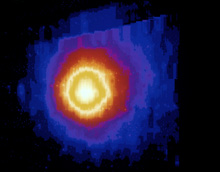WHAT IS FOR DINNER ON THE MOON OR MARS? - LRK -
: " SPACE TECHNOLOGY: RECYCLING FOR EARTH AND BEYOND
SUNNYVALE, California, September 19, 1991 -- 'No waste in
space!' is the motto of a Lockheed scientist studying some really
far-out recycling techniques for tomorrow's Moon and Mars
dwellers.
He thinks his work also will benefit the home planet -- long
before our future space colonists ship out.
'It's certain that men and women will leave Earth to set up
outposts on the Moon and Mars early in the next century,' said
Dr. Steven Schwartzkopf. 'The question we're trying to answer at
Lockheed is how they will live when they get there.' Schwartzkopf
knows these extraterrestrial pioneers will need to grow their own
food, supply their own water, and figure out what to do with the
trash."
Unlike early space explorers, the 21st-century pioneers
won't be coming right back to Earth. "They can't just stock up on
supplies for the trip, then bring home the leftovers,"
Schwartzkopf said. That's what astronauts have done so far, but
it won't work on long missions, let alone on planetary outposts.
"It would be difficult to keep a Moon settlement supplied
with fresh air, water and groceries, and impossible to resupply a
base on Mars. The cost alone would be astronomical," he said.
"Besides, these bases need to be pretty self-sufficient because
they're so far from Earth. We might have trouble getting to them
in time if they run out of the necessities. The system we're
designing solves these problems."
Schwartzkopf envisions a Moon or Mars base with greenhouses
that provide hydroponically grown food for the population -- and
in the process, help purify the air. He also is planning
recycling systems that will keep the base supplied with plenty of
usable water, and a means for processing solid wastes that also
would provide fuel for base operations -- as well as fertilize
the food crops.
What really excites Schwartzkopf about all this, beyond the
sci-fi aspects, is the potential to use his technologies to solve
problems closer to home.
"For example, some of the water- and solid-waste reclamation
techniques could recycle much of the waste water we dump into our
oceans and help us eliminate the need for landfills. And the
techniques we're investigating for developing Martian food crops,
which must be resistant to drought, cold, and ultraviolet
radiation, certainly could improve food production on Earth," he
said. "Survivors of California's drought -- and last winter's
freeze -- can relate to that!"
snip
Many folks would like to see us back on the Moon and developing its resources.
Sunday, May 09, 2004
Subscribe to:
Post Comments (Atom)





No comments:
Post a Comment
Note: Only a member of this blog may post a comment.